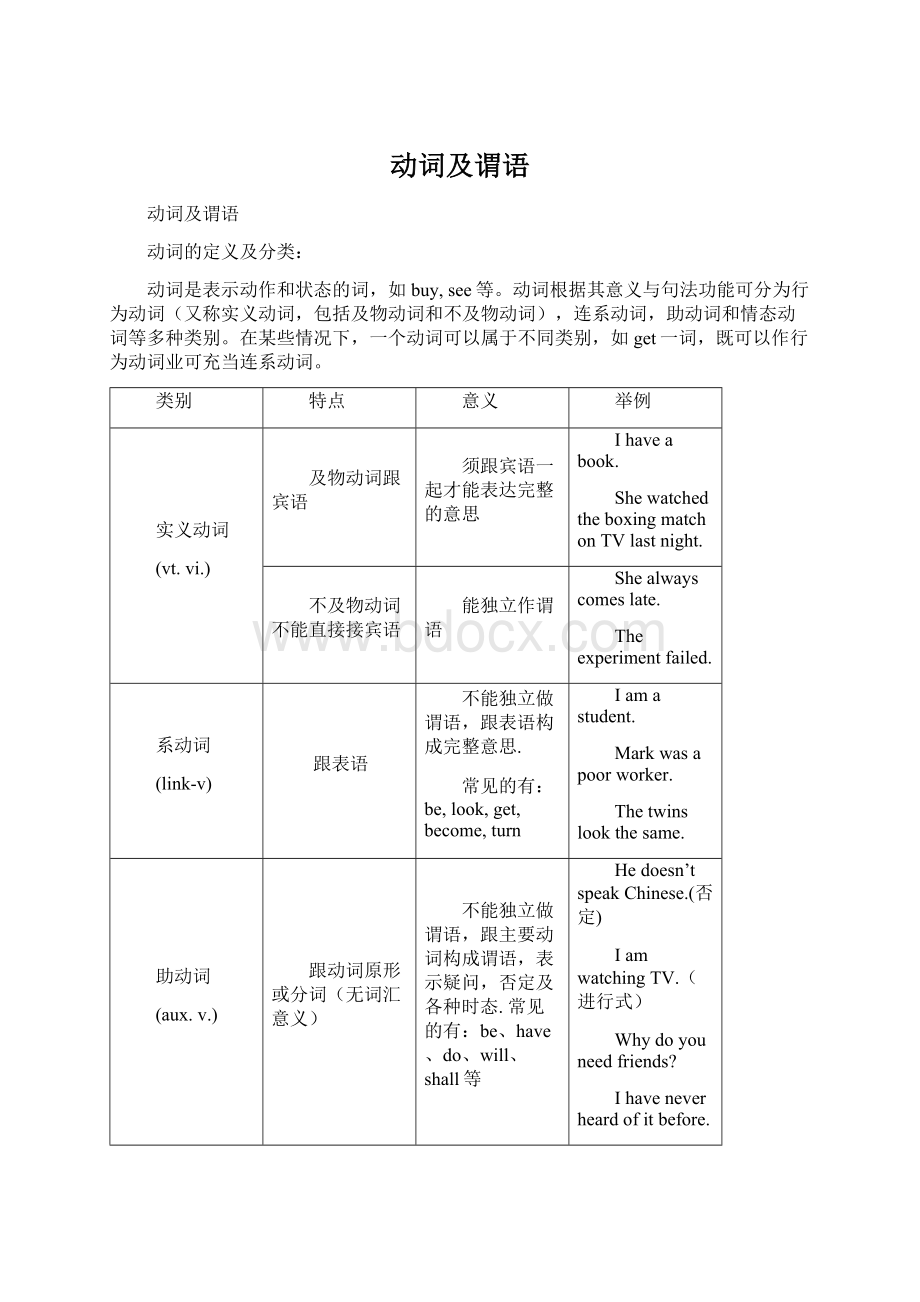动词及谓语.docx
《动词及谓语.docx》由会员分享,可在线阅读,更多相关《动词及谓语.docx(8页珍藏版)》请在冰豆网上搜索。

动词及谓语
动词及谓语
动词的定义及分类:
动词是表示动作和状态的词,如buy,see等。
动词根据其意义与句法功能可分为行为动词(又称实义动词,包括及物动词和不及物动词),连系动词,助动词和情态动词等多种类别。
在某些情况下,一个动词可以属于不同类别,如get一词,既可以作行为动词业可充当连系动词。
类别
特点
意义
举例
实义动词
(vt.vi.)
及物动词跟宾语
须跟宾语一起才能表达完整的意思
Ihaveabook.
ShewatchedtheboxingmatchonTVlastnight.
不及物动词不能直接接宾语
能独立作谓语
Shealwayscomeslate.
Theexperimentfailed.
系动词
(link-v)
跟表语
不能独立做谓语,跟表语构成完整意思.
常见的有:
be,look,get,become,turn
Iamastudent.
Markwasapoorworker.
Thetwinslookthesame.
助动词
(aux.v.)
跟动词原形或分词(无词汇意义)
不能独立做谓语,跟主要动词构成谓语,表示疑问,否定及各种时态.常见的有:
be、have、do、will、shall等
Hedoesn’tspeakChinese.(否定)
IamwatchingTV.(进行式)
Whydoyouneedfriends?
Ihaveneverheardofitbefore.
情态动词
(mod.v.)
跟动词原形(有自己的词汇意思)
不能独立做谓语。
表示说话人语气、情态,无人称和数的变化。
常见的有:
can/could/may/might
/must/need/haveto/oughtto/will/would/shall/should
Wecandoitbyourselves.
Thatwouldbebetter.
Theworkmustbefinishedassoonaspossible.
Asituationlikethismayoccurfromtimetotime.
英语动词的五种基本形式及变化规则:
英语动词有五种基本形式。
它们是动词原形、第三人称单数现在时(简称单三)、过去式、过去分词和现在分词。
这五种形式和助动词一起构成英语的各种时态和语态等。
原形
第三人称单数
过去式
过去分词
现在分词
work
works
worked
worked
working
write
writes
wrote
written
writing
have
has
had
had
having
do
does
did
done
doing
1.单三形式变化规则:
(1)一般动词在词尾加-s,在清辅音后读/s/,在浊辅音或元音后读/z/;在t后读/ts/,在d后读/dz/。
例如:
help→helps,swim→swims
(2)以字母s,x,ch,sh结尾的动词加-es,读/iz/,在d后读/dz/.以o结尾的动词也加es,读/z/。
例如:
guess→guesses,teach→teaches,go→goes
(3)以辅音字母加y结尾的动词,先变y为i,再加-es,读/z/。
例如:
fly→fliescarry→carries
2.动词-ing形式的构成:
(1)一般在动词末尾加-ing.例如:
go→going,ask→asking
(2)以不发音字母e结尾的动词,先去掉e,再加-ing.例如:
write→writing,close→closing,take→taking
(3)以重读闭音节结尾的动词,如果末尾只有一个辅音字母,应先双写这一字母,再加-ing.例如:
get→getting,sit→sitting,put→putting,run→running,begin→beginning
3.规则动词过去式的构成
(1)一般在动词原形末尾加-ed.结尾是e的动词直接加-d.例如:
look→looked,play→played,live→lived,hope→hoped
(2)末尾只有一个辅音字母的重读闭音节词,先双写这个辅音字母,再加-ed.例如:
stop→stopped,plan→planned,trip→tripped
(3)结尾是“辅音字母+y”的动词,先变“y”为“i”再加-ed.例如:
study→studied,carry→carried
谓语
谓语的定义:
谓语一般放在主语之后,用来说明主语所做的动作或具有的特征和状态。
谓语通常由动词或动词短语来充当,具有各种时态,语态和语气的变化,前面还可以加上情态动词或助动词等。
如:
Hepractisesrunningeverymorning.
Iexpectyoutotakeme.
YesterdayafternoonhereachedBeijing.
Shetakescareofhesickmother.
Hehasgotridofhisbadhabit.
Youmaykeepthebookfortwoweek.
You’dbetternottakethemagazineoutofthereading-room.
Hehastogotoseeadoctor.
Shedoesn’tseemtolikedancing.
Wearegoingtocallonhimtonight.
Wearestudents.
Helookedabitexcited.
练习:
1.We often write to each other.
2.Heworkshard.
3.Thesunrisesintheeast.
4.Lightgoesfasterthansound.
5.Youwillsucceedifyoutry.
6.HearrivedinHangzhouanhourago
7.Theirchildrenoftenwenthungryintheolddays.
8.Hecamelatethreetimesthisweek
9.Listen!
MaryissinginganEnglishsongintheclassroom.
10.Theyareplantingtreesonthehillthesedays.
11.TheywantedtoknowwhenwewereleavingforShanghai.
12.Theyhaveboughtacomputer.
13.Hehaslosthisbook.
14.Whenwegotthere,thefootballmatchhadalreadystarted.
15.IhadworkedinahospitalforthreeyearsbeforeIcamehere.
16.Ididn’tknowifshewouldcome.
17.Iwasn’tsurewhetherhewoulddoit.
18.Ididn’tknowifshewasgoingtocome.
19.Sorry,Iforgettoposttheletterforyou.
20.Itisdifficultformetomovethebedbymyself.
同位语
一般做主语或是宾语的同位语,句子的主干已经完整,同位语作为一个插入成份作补充说明之用。
一般同位语成份可分为前位同位语和后位同位语,即同位语分别在主词的前面和后面。
另外也有that引导的同位从句。
They all like swimming.
Mr.Black,ourEnglishteacher,isagoodtennisplayer.
练习:
1.Atlast,wereachedourdestination,Hamburg.
我们最终到达了目的地——汉堡。
2.HegavehiswifeJonesawonderfulwatch。
3.All the things have two faces, a light one and a dark one.
一切事物都有两个方面:
光明的一面和黑暗的一面。
4. He always laughed loud and long at his own jokes, a habit that won him
no admirers. 他总是对自己所讲的笑话发出长时间的、响亮的笑声,这个习惯别人都感到讨厌。
5.Some animals, as foxes and squirrels live in woods.
有些动物,如狐狸和松鼠,栖息在森林里。
6.Thequestionhowtoanswerhisletterannoyedme.
怎样回他的信这个问题使我很烦恼。
高中英语插入语解析
插入语是英语口语中很常见的语法现象。
通常用一个逗号把它与句子隔开,其位置可在句首、句中或句末。
其作用是对一句话、某一个词或词组做些附加的解释和说明,或在两句之间起连结作用。
可以用作插入语的有:
不定式、分词、副词、介词短语和句子等等。
下面就中学阶段出现的插入语举例说明:
1.副词作插入语:
能用作插入语的常见的副词有:
indeed的确,certainly,surely无疑,however然而,obviously显然,frankly
坦率地说,naturally自然,luckilyforsb算某人幸运,fortunately幸好,strangely奇怪,honestly真的,briefly简单地说,generally通常地,besides
而且等。
如:
Certainly,Iwon’tacceptsuchafoolishplan.
我当然不会采纳这个患蠢的计划
YouspeakEnglishquitefluently--indeed.
你的英语的确讲得很棒。
Happilyforhim,hisfather'ssecondwifewaskindtohimtoo.
You'llbeabletopassthecomingexam,surely.
Luckilyforhim,hedidn'thurtintheaccident.
Honestly,Idon'tneeditatthemoment.
2、形容词作插入语:
能用作插入语的常见的形容词有:
true真的,funny真可笑,strangetosay
说也奇怪,excellent,wonderful极好的mostimportantofall最为重要等。
如:
Wonderful,ourteamhaswonagain.太好了,我们队又赢了.
True,youhavedonewell.
真的.你干得不错。
Strangetosay,shedidn'tgohomethatday.
说也奇怪,那天她没有回家。
Thepiecesofstonewerethencarriedtothenewplaceforthetemple,60metershigherupthehill.
然后把石头搬运到寺庙的新址--比原址高出60米的山上。
Thebookcanbeenjoyedbyeveryone,youngorold.
这本书,老幼皆宜,人人能看懂。
3、介词作插入语:
能用作插入语的介词短语常见的有:
in a few words(或in sum,in short)简而言之,in other words换句话说,in a sense在某种意义上,in general一般说来,in my view在我看来,in his opinion(judgment)按照他的意见(判断),in conclusion总之,in summary概括地说,in fact事实上,in the first place首先,in addition此外,of course当然,to our knowledge据我们所知,to my joy(delight, satisfaction)使我欣慰(高兴、满意)的,to their surprise(astonishment, amazement)使他们惊奇的,to her regret (disappointment)使她遗憾(失望)的,for instance(或example)例如,as a matter of fact事实上等。
如:
He said he was a teacher, but in fact,he was a spy.
You can't wait any more, in other words, you should start at once.
Do not plant,for example,rice year after year in the same field. 例如,在同一块地里,不要年复一年地种稻谷。
By the way,Bob sends his best wishes. 顺便说一下,鲍勃给您你好了。
As a result,we have to water the vegetable garden.
结果,我们不得不给菜地浇水。
4、分词作插入语:
能用作插入语的常见的分词有:
strictly speaking严格地说, generally speaking一般地说, judging from…根据……判断等。
如:
Generally speaking, naughty boys like to speak in class.
Judging from his look, he is very sick.
Provided that you are a reporter,what should you do?
假如你是个记者,你该怎么办?
He rang up all his friends in the pop world,including the most famous pop stars.
他打电话给歌坛上的所有朋友,包括最著名的流行歌星。
Compared with China, the USA is smaller.
5.不定式作插入语:
能用作插入语的常见的不定式短语有:
to make the matter worse, to tell the truth, to be frank, to be honest ,
tosum up, to start with, to begin with, to be sure 等。
如:
To tell the truth ,I don't like you.
说老实话 , 我不喜欢你 .
I didn't start early. To make the matter worse, it was raining hard.
To put it mildly, he was not up to the mark.
To conclude, it was a great success.
To be sure,that’s a very useful book.确实,那是一本很用的书。
I don’t like the book at all,to be honest.
老实说,我一点也不喜欢那本书。
But I think we’ll give her a shot,just to be safe.
但是,我认为为了安全起见,还得给他一枪。
6、一些固定短语作插入语:
常见的能用作插入语的固定短语。
如:
worse than all, worse than ever, worse still, what’s more; what’s worse….
I felt very hungry. Worse than all, I took no money.
It began to rain. Worse than ever, I had no umbrella.
7. 语句式插入语:
常见的能用作插入语的语句有:
I think; I suppose, that is to say; as we know, as I see, believe it or not…I hope, I guess, I tell you, I say, I'm afraid, I'm sure, as you know, I am sure我可以肯定地说, I believe我相信, I wonder我不知道, you know你知道, you see你明白, that is也就是说, it seems看来是, as I see it照我看来, what is important (serious)重要(严重)的是,I‘m afraid恐怕,it is said据说等等,它们可以置于句中或句尾。
I suggest you choose someone who you think is kind and friendly.
This diet, I think, will do good to your health.
It won't be raining long, I hope.
You will have to work harder, you know, if you want to succeed.
He won’t come,I’m afraid.恐怕他不来了。
You are right,I think.我认为你是对的。
8.名词或代词作插入语:
England,the largest country in Britain,is in the southeast of this island.
英格兰是不列颠岛上最大的一个国家,位于这个岛的东南部。
Beijing,the capital of China,is a beautiful city.
北京,中国的首都,是一座美丽的城市。
He advised farmers to choose the best seed-heads,the ones that had the best color .
他劝告农民要先选最好的谷穗,即那些颜色最好的谷穗。
Li Ming,head of your workshop,is speaking at the meeting.
李明,你的车间主任,正在会上讲话。
9.连词作插入语:
Everyone here,whether men or women,must obey the rules.
这儿的每个人,无论男女,必须遵守制度。
10.省略句作插入语
The piano is as good as,if not better than,that one.
这架钢琴,即使不比那架好,至少跟它一样好。
He said that,if any,there was only a few.
练习:
1.HisspokenEnglishisverygood,indeed.
2.Strtangetosay,shehasn’tgotmyletteruptonow.
3.China,infact,isnotadevelopedcountry.
4.Totellthetruth,iamnotgoodatlanguagestudying.
5.Theywillcometohelpus,Isuppose.
6.Hewillfailintheexam,Ithink.
7.Whatdoyouthinkweshoulddofirsttoday?
8.Hewillnotpassthephysicsexam,Iamafraid.
9.Whatwouldyousuggestweshoulddonext?
10.Judgingfromhisaccent,hemustcomefromShanghai.